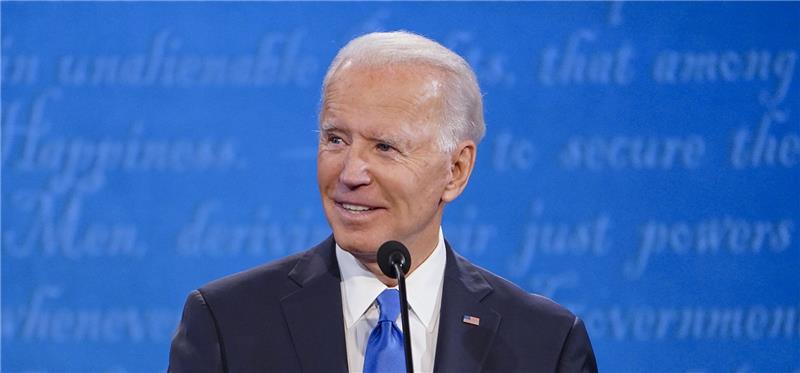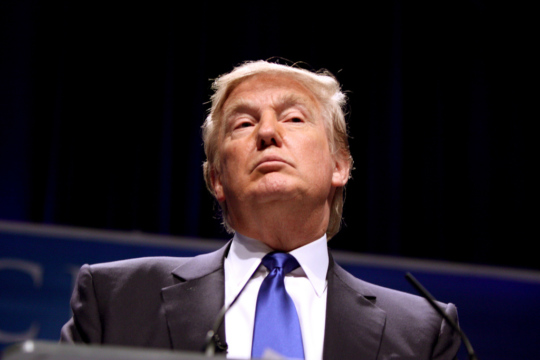
‘Campanha bizarra, cruel e divisiva’, avalia especialista americano
Presidente emérito do Inter-American Dialogue, Peter Hakim diz que maioria republicana sabe que Hillary é provável vencedora.
A Daily Publication of The Dialogue
Joe Biden takes office today as president of the United States. His inauguration follows tense weeks in Washington surrounding a Jan. 6 riot in which supporters of outgoing President Donald Trump violently burst into the U.S. Capitol in a deadly insurrection that Trump is accused of inciting. How has the riot at the U.S. Capitol been seen in Latin America and the Caribbean, and to what extent does the civil unrest shake confidence in U.S. leadership and credibility? What effects will Trump’s actions as president have on elections and democratic institutions in the region? What must Biden do in order to effectively engage with Latin America on issues such as democratic norms and the rule of law following Trump’s presidency?
Isabel Saint Malo, former vice president of Panama: “Latin Americans watched recent events at the Capitol with familiarity and surprise. The scenes were familiar to us in a region where civil unrest is increasingly present, though we never expected to see them in the United States. As Latin American citizens increasingly express dissatisfaction with the status quo and an existing broken social contract that does not meet expectations, the region needs partners that support our efforts to overcome inequalities and other challenges. President-elect Biden was a champion of engagement with the region during the Obama administration. I personally participated in efforts convened by the then-vice president; his interest and understanding of the region was clear. That record and proposals included in his campaign lead us to believe that the incoming administration will pay more attention to neighboring Latin America than did Biden’s predecessor. Historically, the United States’ relationship with the region has been marked by security issues, including organized crime, drug trafficking and migration. The incoming administration will need to design a more comprehensive agenda. Security threats are directly linked to the broken social contract, inequality, poverty, unemployment and other social realities. As long as Latin Americans see limited opportunities in their own countries, they will continue migrating north or engaging in criminal activities. A new agenda that intends to strengthen democratic norms and the rule of law must be linked to the security and development agendas. The approach must be integral, and engagement with Latin American leaders to design it collaboratively would be a strong first step.”
Jason Marczak, director of the Adrienne Arsht Latin America Center at the Atlantic Council: “President-elect Biden, more than any of his predecessors, is entering the presidency with a profound understanding of Latin America and the Caribbean and a recognition of its importance to the United States. This should not be taken lightly. For those of us who care so deeply about the region and its prosperity, the United States will now have a commander-in-chief with a long track record in exhibiting U.S. leadership to address longstanding challenges—from his work in advancing prosperity in Central America to his being present at the inauguration of Plan Colombia as a U.S. senator. Following President Trump’s baseless claims of fraud and his disinformation campaign, Biden’s inbox now includes restoring trust in democracy at home as well as projecting a new, more humble democratic leadership in our hemisphere. In losing the election, Trump was an inspiration for would-be strongmen, for those who saw institutions as an instrument for personal gain rather than respected for their role in serving society. The danger of Jan. 6 is not just the violent insurrectionists, or Trump’s pleading for his followers to ‘show strength’ at the Capitol, it is the denial of the results of the election and the guidepost that has given to those outside our borders whose only interest in democracy is when it works in their favor. Biden enters office with the task of reversing this damage. It will be critical to work with partners to share the lessons of our own challenges so that the Trump playbook does not take hold, with potentially even more disastrous results, in younger, more fragile democracies already reeling from institutional challenges further magnified by the Covid-19 pandemic. U.S. technical and financial partnership to strengthen institutions, which, among other things, begins with addressing endemic corruption, will be among the top priorities of this new administration.”
Roberta Lajous, former Mexican ambassador to Cuba, Bolivia and Spain: “The Biden administration has a unique historical opportunity to rebuild ties with Latin America after four years of neglecting development issues, including economic growth, democracy and the rule of law. No previous incoming U.S. president has had more or better firsthand knowledge of the region than Joe Biden. The current pandemic has probably caused more damage to Latin America than any other region of the world. It is an opportunity for the United States to support universal vaccination in 2021 and start sustainable recovery on a democratic basis, given the right incentives. Franklin D. Roosevelt’s Good Neighbor Policy, updated to the 21st century, can serve as a paradigm to regain U.S. prestige and presence in Latin America, with President Biden and the U.S. Congress working together toward that end. Leading by example on how a democracy can get the right things done, in emergency situations as we now face, would certainly re-engage Latin America in a lasting partnership. First signals that this is possible will come with the announcement of Biden’s appointments of officials responsible for Latin American affairs and, hopefully, the renewal of the Summit of the Americas.”
John Feeley, former U.S. ambassador to Panama: “Most Latin Americans, especially political and economic elites with connections to the United States, reacted to the Jan. 6 riot at the U.S. Capitol in shock and with fear. In traditional anti-American sectors, there is a smug sense of vindication that a prideful and bullying superpower has finally reaped what it sowed. However, with the exception of Brazil’s Bolsonaro, Latin American leaders and societies generally welcome Trump’s exit and Biden’s return to the regional stage. The Biden Central American strategy, which commits $1.4 billion to mitigating the root causes of mass migration, is an excellent indication that the new administration will invest in pragmatic cooperation to solve common problems. However, in the face of staggering challenges such as Covid-19, climate change, poverty, inequality and corruption, Joe Biden’s most immediate and important task is simply to change the tone of U.S. policy with Latin America. He must humbly recognize to democratic partners the self-inflicted damage to American democracy, and explicitly commit to repairing it through the same institutional strengthening practices that U.S. policy has prescribed in the region for decades. Such a policy statement, repeated often and reinforced by his diplomatic, judicial and security principals, will help blunt the perennial Latin American criticisms of hypocritical American exceptionalism. More importantly, it will lay the foundations of trust and genuine partnership between the United States and the hemisphere that have eroded under President Trump.”
Rubens Barbosa, former ambassador of Brazil to the United States: “The unprecedented insurrection against the Capitol was seen with apprehension and perplexity in Latin America. But it did not come as a surprise, given the polarization and radicalization of domestic politics in the United States. All Latin American countries in one way or another have already experienced similar riots against institutions. For this reason, I don’t think that the confidence in U.S. leadership and credibility has been shaken and damaged. In the case of Brazil, taking into consideration the polarization and the gradual radicalization of internal politics with the current government, I reckon that a positive effect comes from the mayhem at the U.S. Capitol. What happened in Washington was a wake-up call to politicians and the business community about the risk Brazil faces as its presidential election approaches. President Bolsonaro made a public statement on the need to change electoral law to avoid fraud in 2022, adding that if nothing is done, the situation in Brazil could be worse than in the United States. Democracy and Institutions should be defended, and what happened after the violent demonstration at the U.S. Congress was proof of the strength and resilience of the institutions and how to preserve them. Latin America, and especially South America, are not high on Biden’s foreign policy agenda. If and when the U.S. government shapes a new strategy on the region, immigration, Venezuela and Cuba are the main priorities. Democracy, rule of law, security and corruption will also be in the official U.S. rhetoric, but improvement in all those areas depends more on the will of the people to engage with governments than examples of other nations.”
Nicolás Mariscal, member of the Advisor board and chairman of Grupo Marhnos in Mexico City: “The insurrection at the U.S. Capitol will have rippling internal and external effects. The protesters violently interrupted a protocolary and constitutional tradition of the U.S. electoral process, which the incumbent president’s false allegations of fraud had already hampered. On top of provoking civil unrest, efforts to overturn the results have fragmented the Republican Party and polarized public opinion. Objections in the certification process have undermined the value and integrity of democratic institutions, and even those were completely overshadowed by an incident that led to five deaths and numerous arrests. The country regarded as the beacon of democracy is enduring a turbulent presidential transition. Trump’s legacy, ideology and principles will transcend, resounding across the continent. Often, political trends in the United States trickle down to Latin America. The rise of populist regimes in the region was somehow influenced by Trump’s arrival to the presidency. Many leaders like Bolsonaro and López Obrador have enacted policies and shown personality traits aligned with the Trump administration. In that sense, Joe Biden faces considerable challenges in his approach to Latin America. A more ambitious agenda on multilateral platforms, climate change, sustainable development and migration will entail a drastic transformation of regional interactions and the bilateral relations with each country, particularly Mexico. The counterparts will have to decide whether to resist this change or embrace the opportunity of jointly addressing shared problems.”
Maria Velez de Berliner, managing director of RTG-Red Team Group, Inc.: “Latin America saw the Capitol riot as an indicator and warning of what might happen in the region’s next round of elections, if not sooner. Familiar with political chaos, riots, marches, violence and fraudulent elections, Latin Americans cannot yet believe a seated president of the United States would refuse to concede to his legitimately elected successor--least of all incite a riot against the central pillar of U.S. democratic institutions. The United States has tried for more than a century through soft and, most often, hard power to implement Jeffersonian democracy throughout Latin America and the Caribbean, failing disastrously in Cuba and Venezuela. The riot at the U.S. Capitol annulled those efforts. Few Latin Americans today trust in United States’ democracy. There is a palpable concern in the region as it watches the United States go the way of Latin America, or even worse. With the exception of Fujimori’s auto-golpe in Peru in 1992, no seated Latin American president has incited his followers to go against the institutions of democracy for as long and as successfully as President Trump. Biden must listen to what Latin America needs, not to what Biden wants for, or in, Latin America. The riot ensured that the time is gone for the U.S government to tell Latin Americans how to govern themselves and what type of democracy to have. If Biden does not listen, anti-democratic protests and institutional distrust will deepen in Latin America with deleterious and permanent damage to its remaining, but feeble, democratic institutions. If Biden fails, the United States will lose democracy to those who choose to follow the rioters’ example in Latin America.”
 The Latin America Advisor features Q&A from leaders in politics, economics, and finance every business day. It is available to members of the Dialogue’s Corporate Program and others by subscription.
The Latin America Advisor features Q&A from leaders in politics, economics, and finance every business day. It is available to members of the Dialogue’s Corporate Program and others by subscription.
Presidente emérito do Inter-American Dialogue, Peter Hakim diz que maioria republicana sabe que Hillary é provável vencedora.
Michael Shifter fue entrevistado por Gerardo Torres de El Salvador sobre los temas más destacados en la agenda regional. Entre otros asuntos, Shifter habló sobre el futuro de la paz en Colombia, la crisis política y económica en Venezuela, y el impacto de las elecciones de Estados Unidos en la región.
¿Debe México hacer campaña en Estados Unidos para que conciudadanos se registren y voten, y otra para resaltar los beneficios del TLCAN? ¿Es momento de pensar en cómo recibiremos a millones de deportados, hay que dar la pelea en tribunales internacionales de derechos humanos? ¿Llegó la hora de preparar represalias comerciales contra Estados Unidos y considerar nuevos socios en AL, Europa y Asia? Son muchas preguntas, y variadas y hasta opuestas las respuestas que dan diplomáticos, politólogos y analistas. Sólo una sola cosa es cierta: Trump es impredecible.
 File Photo: Facebook page of Joe Biden.
File Photo: Facebook page of Joe Biden.

